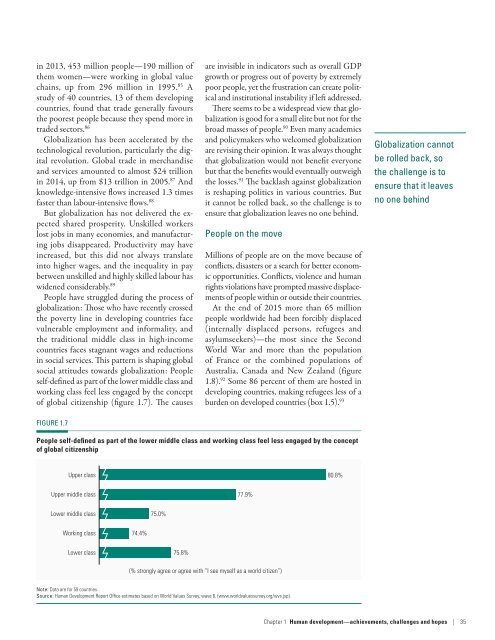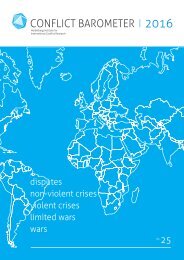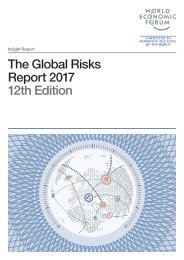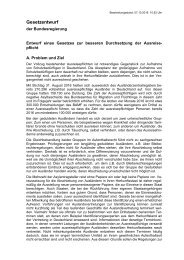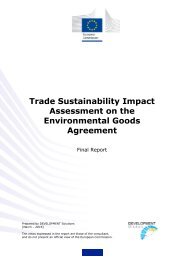Human Development Report 2016
6Tyccfrzw
6Tyccfrzw
You also want an ePaper? Increase the reach of your titles
YUMPU automatically turns print PDFs into web optimized ePapers that Google loves.
in 2013, 453 million people — 190 million of<br />
them women — were working in global value<br />
chains, up from 296 million in 1995. 85 A<br />
study of 40 countries, 13 of them developing<br />
countries, found that trade generally favours<br />
the poorest people because they spend more in<br />
traded sectors. 86<br />
Globalization has been accelerated by the<br />
technological revolution, particularly the digital<br />
revolution. Global trade in merchandise<br />
and services amounted to almost $24 trillion<br />
in 2014, up from $13 trillion in 2005. 87 And<br />
knowledge-intensive flows increased 1.3 times<br />
faster than labour-intensive flows. 88<br />
But globalization has not delivered the expected<br />
shared prosperity. Unskilled workers<br />
lost jobs in many economies, and manufacturing<br />
jobs disappeared. Productivity may have<br />
increased, but this did not always translate<br />
into higher wages, and the inequality in pay<br />
between unskilled and highly skilled labour has<br />
widened considerably. 89<br />
People have struggled during the process of<br />
globalization: Those who have recently crossed<br />
the poverty line in developing countries face<br />
vulnerable employment and informality, and<br />
the traditional middle class in high-income<br />
countries faces stagnant wages and reductions<br />
in social services. This pattern is shaping global<br />
social attitudes towards globalization: People<br />
self-defined as part of the lower middle class and<br />
working class feel less engaged by the concept<br />
of global citizenship (figure 1.7). The causes<br />
are invisible in indicators such as overall GDP<br />
growth or progress out of poverty by extremely<br />
poor people, yet the frustration can create political<br />
and institutional instability if left addressed.<br />
There seems to be a widespread view that globalization<br />
is good for a small elite but not for the<br />
broad masses of people. 90 Even many academics<br />
and policymakers who welcomed globalization<br />
are revising their opinion. It was always thought<br />
that globalization would not benefit everyone<br />
but that the benefits would eventually outweigh<br />
the losses. 91 The backlash against globalization<br />
is reshaping politics in various countries. But<br />
it cannot be rolled back, so the challenge is to<br />
ensure that globalization leaves no one behind.<br />
People on the move<br />
Millions of people are on the move because of<br />
conflicts, disasters or a search for better economic<br />
opportunities. Conflicts, violence and human<br />
rights violations have prompted massive displacements<br />
of people within or outside their countries.<br />
At the end of 2015 more than 65 million<br />
people worldwide had been forcibly displaced<br />
(internally displaced persons, refugees and<br />
asylumseekers) — the most since the Second<br />
World War and more than the population<br />
of France or the combined populations of<br />
Australia, Canada and New Zealand (figure<br />
1.8). 92 Some 86 percent of them are hosted in<br />
developing countries, making refugees less of a<br />
burden on developed countries (box 1.5). 93<br />
Globalization cannot<br />
be rolled back, so<br />
the challenge is to<br />
ensure that it leaves<br />
no one behind<br />
FIGURE 1.7<br />
People self-defined as part of the lower middle class and working class feel less engaged by the concept<br />
of global citizenship<br />
Upper class<br />
80.8%<br />
Upper middle class<br />
77.9%<br />
Lower middle class<br />
75.0%<br />
Working class<br />
74.4%<br />
Lower class<br />
75.8%<br />
(% strongly agree or agree with “I see myself as a world citizen”)<br />
Note: Data are for 59 countries.<br />
Source: <strong>Human</strong> <strong>Development</strong> <strong>Report</strong> Office estimates based on World Values Survey, wave 6, (www.worldvaluessurvey.org/wvs.jsp).<br />
Chapter 1 <strong>Human</strong> development — achievements, challenges and hopes | 35


